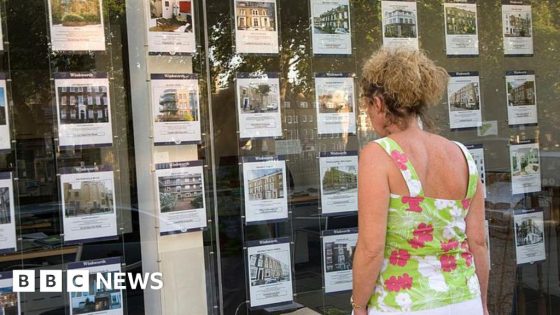House price growth picked up in the year to July as wages rose, according to the Nationwide.
The mortgage lender said the growth rate rose to 2.1% last month, the fastest pace since December 2022.
Some people were feeling more confident about getting a mortgage as their pay packets went up, Nationwide chief economist Robert Gardner said.
But relatively high mortgage rates and affordability issues acted as a brake for prospective buyers.
The average price of a house increased to £266,334 last month, up 2.1% from the previous year, however, prices are still below the all-time highs recorded in the summer of 2022.
The growth rate was higher than some economists had predicted.
Part of the reason for the jump in annual price growth was weak growth at the same time last year, Mr Gardner said.
However, people are also feeling more confident as their wages rise in real terms, the building society’s chief economist added.
Although pay growth has been slowing, it has still been outpacing rising prices.
The speed of pay growth is one of the economic factors the Bank of England will consider at its meeting on Thursday to decide interest rates.
The Bank has held rates at 5.25% – the highest level for 16 years – seven times in a row.
This has pushed up repayments for people with tracker mortgages, and borrowing costs for people trying to secure or renew mortgage deals.
Higher mortgage rates are part of the reason many people struggled to afford buying a home.
Relatively large deposits are also making buying a challenge for first-time buyers, Mr Gardner said.
One of the main reasons house prices are so high in the UK relative to wages is that “supply of housing has not caught up with demand for quite a while”, he added, which has also had a knock on impact on pushing rental prices up.
The new government has pledged to deliver 1.5 million homes over the five years, in part by overhauling the UK planning system, and letting developers build on some green belt land.
Nationwide, one of the biggest mortgage lenders in the UK, bases its figures on house prices on its own lending.
The statistics do not include buyers who purchase homes with cash, or buy-to-let deals. Cash buyers account for about a third of housing sales.
Source Agencies



